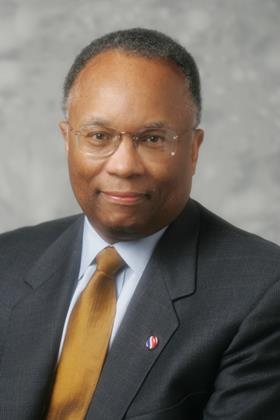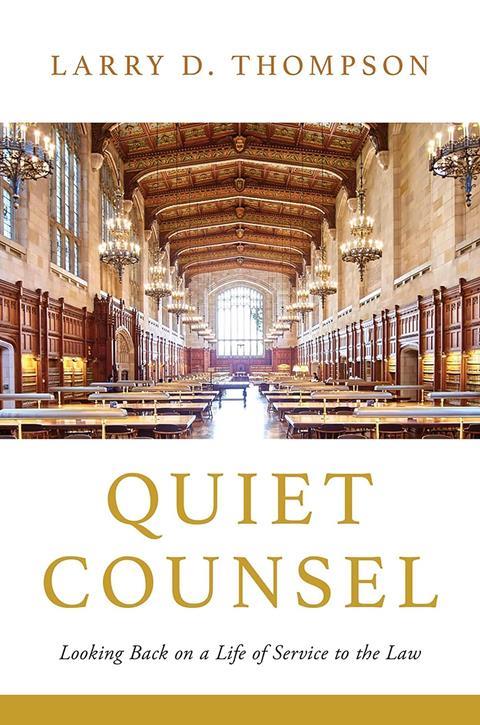Former U.S. Deputy Attorney General Larry D. Thompson published his memoir, “Quiet Counsel: Looking Back on a Life of Service to the Law,” on Nov. 19. With a voice reflective of a beautiful legal mind, Thompson recollects stories from his illustrious career—practicing law at the highest levels of the U.S. government and within some of the world’s most influential corporations. Thompson’s wisdom imbues every page. In a time of politically charged turbulence, “Quiet Counsel” is a soothing philosophical read, a reminder of the foundational values of justice, fairness, and security that unite us.

Thompson weighs in on pressing concerns of corporate responsibility: at what point short-termism imperils long-term corporate interests, for instance, and how culpability is determined in corporate wrongdoing. Should the government prosecute rogue employees, the company, or both? In the context of these perennial debates, Thompson draws from a wealth of historic professional experiences. He led the Justice Department’s (DOJ) Enron investigation in the early 2000s and served as the DOJ-appointed Independent Compliance Monitor and Auditor for Volkswagen AG following its infamous Dieselgate scandal in the 2010s.
The memoir ruminates on the systems and behavioral patterns that drive corporate culture for better or worse; what counsel and chief ethics and compliance officers (CECOs) should do when they encounter “soft resistance” from their companies’ executives; and why diversity is good for business.
Compliance Week interviewed Thompson about some of the most powerful takeaways for ethics and compliance professionals.
Patterns of misconduct
By the time of Thompson’s Senate confirmation in 2001, patterns of bad corporate culture were all too familiar to him. Decades later, those patterns persist: Lawyers and CECOs who lose sight of whom they represent (i.e., the entity, not the chief executive). The primacy of profit maximization for shareholders to the exclusion of stakeholder interests. An insidious culture of fear within an organization.
“You have situations where leaders rule by fear,” Thompson told Compliance Week. Business goals must be achieved at all costs, no questions asked. “As one employee told me once in one of my internal investigations, when I asked her, ‘Why didn’t you go back and tell your boss what was going on about these unrealistic goals?’ She answered, ‘I did not want to spend my career in a broom closet.’”
“You have situations where leaders rule by fear. As one employee told me once in one of my internal investigations, when I asked her, ‘Why didn’t you go back and tell your boss what was going on about these unrealistic goals?’ She answered, ‘I did not want to spend my career in a broom closet.’”
– Larry D. Thompson, Former U.S. Deputy Attorney General

The best way to address tacit behavioral patterns is to make them explicit. Call them out for what they are, Thompson said. And, critically, listen to employees.
“When you get to the point where you don’t want to hear what your people are experiencing as you run the organization, that is a huge red light,” he said.
In the memoir, Thompson credits Harvard Business School Professor Lynn S. Pain’s seminal 1994 article, “Managing for Organizational Integrity,” as a guideline for implementing values-based integrity systems in an organization. Paine put forth a principle that shaped his career moving forward, Thompson writes, which is that establishing a strict compliance regime isn’t enough. Business leaders must mold a culture that “sets guidelines that can be applied outside the four corners of any compliance document or code of conduct.”
’Soft resistance’
Thompson’s book gets candid about the impediments faced by outside counsel hired to conduct internal investigations. Executive teams, he finds, are often eager to detect misconduct. They’re keen to correct it too. But when it comes to the third phase of an investigation–prevention–the zeal wavers. Focus on short-term costs can outweigh long-term benefits of institutional reforms. Thompson describes this reluctance as “soft resistance” to approaching ethics and integrity on an equal footing with profitability and business results. It can take more tacit forms as well, such as through budget cuts. Regardless of how it manifests, there are ways to tackle it.
“First, you need to try to persuade your superiors of why they need to not cut [the compliance budget] to the bone, or why they need to reconsider their approach to resources. … Sometimes I have advocated that you need to try the [gradualism] approach,” Thompson told Compliance Week, meaning compliance leaders can request additional resources in baby steps over several business cycles.
“But you know something? At the end of the day, if you find yourself in an untenable position, you have to have the professional courage to do something about it. You can take it above someone’s head or you can just leave,” Thompson said.
Business case for diversity
Thompson’s memoir delves into his time leading a diversity initiative at the DOJ, where he and Stacey Plaskett worked to bring more diverse talent from a range of racial, ethnic, economic, and geographic backgrounds into the agency’s pipeline. He also discusses how he later brought this mission to PepsiCo., where he served as general counsel. There, he continued working in a similar vein, expanding the diversity of the internal workforce and hiring personnel that comprised a broad range of diverse voices.
“We all know that there are historical wrongs, but I think when you have a position in a business enterprise, your role should be to help the business enterprise. And there’s all kinds of data that suggests that you can have a more effective business enterprise when you have a diverse workforce,” he said.
Too often there is backlash, and a sense of grievance associated with diversity initiatives in corporate America. The way to combat “whispered doubt,” as Thompson calls it, is through strong communication from the top, he said.
“You talk about your hiring process; you make certain that everybody understands it’s not only a fair process, but that you are seeking the best qualified individuals for the job based upon your criteria. … And don’t communicate it on the basis of ‘I’m satisfying social goals.’ You communicate it on the basis of, ‘We are undertaking a hiring process that is the best for this company.’
“Diversity is good business. It’s not something that is a social cause. It’s good business. And I think all of us have an obligation to make our businesses better,” Thompson said.


















No comments yet